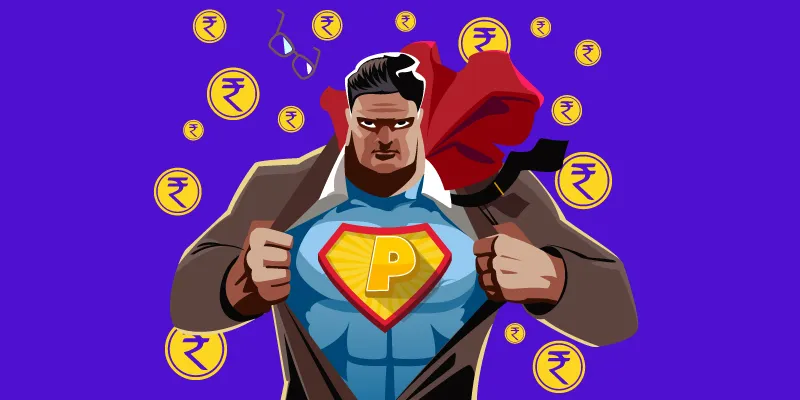Can private labels power e-commerce to profitability?
Profits are hard to come by with e-commerce players not making any from sellers on their marketplaces. Private labels offer a way out for such platforms.

They call it the ‘seven-year itch’ in marriages – when happiness declines, and both parties grow contemptuous of each other. A similar phase can be witnessed in one of India’s most prominent industries: e-commerce.
After pumping in millions and, in some cases, billions of dollars into online B2C marketplaces over the last 6-7 years, the honeymoon period of venture capital firms with e-commerce is coming to an end. Profitability is the only way out, with cash burn and growth having to take a back seat.
It is not easy to make a profit in business-to-customer (B2C) e-commerce. Despite all their efforts in marketing, top players in India have been adding more losses than revenue. According to a recent report, Flipkart, Snapdeal and Amazon together registered a loss of Rs 6,031 crore in 2015-16.
But business is about making money. If commission from sellers on their marketplaces are not making profit, there is only one way out for e-commerce platforms—private labels. World over, it has become the keyword for online sellers.
For any offline or online retailer, exclusivity matters the most: in terms of brands, or collections of brands. For offline stores, performance of a private brand is measured in sales per sq ft, whereas in the online world it is visibility and revenue that matters.
Private labels fill the gaps in consumers’ needs. What is it that the consumer wants that is not met by the current range of merchandise, in terms of price range, aesthetics, look and feel? What are they searching for, and not getting online?
E-commerce platforms also need to bring exclusivity to their offering for a sustained footfall on their sites: either host brands that are exclusive to them online to get repeat customers, or have exclusive private labels. E-commerce titans are making unprecedented efforts in this regard–in horizontals as well as verticals. While it may not be easy to predict the final result, it looks like the right path to tread for now.
Beginning in India
Amazon made its debut in private label long ago in the US, its home turf. AmazonBasics products—which includes Bluetooth speakers, headphones, travel accessories, mobile accessories such as charging cables and cases, pet products, desk chairs, fitness accessories, etc.—were made available in India since September 2015.
In December 2016, Flipkart launched ‘Flipkart Smartbuy’, an umbrella brand to sell in about 50 categories. Over the last four months, Flipkart Smartbuy has started selling in 12 categories. Adarsh Menon, Head of Private Label at Flipkart, told YourStory that across these categories, private labels contribute anywhere between 10 and 45 percent to revenue, with the highest contribution coming from chargers, power banks, speakers and headphones. Flipkart-owned online fashion portal Myntra had launched its private label category as early as 2012. It now has 14 private labels, in addition to 2,000 brands on the platform.

Although fast-moving consumer goods (FMCG) was believed to be a tough market to crack, online grocery seller Bigbasket is already approaching breakeven, with snacks, staples, fruits and vegetables, chocolate, and gourmet products in its multiple private labels. It is now introducing non-food items like wet wipes, disposable bags and buckets. Co-founder and CEO Hari Menon says their strategy is to introduce private labels in categories that are not competitive, and with just one or two players. “Thus you can gain market share quickly. Besides, providing 30-40 percent profit margins, private label products also give visibility to the brand as it reaches every home. In turn, it provides customer stickiness,” he explains.
Veterans are also venturing into private labels in e-commerce. Reliance-owned AJIO, as an online retailer, has strongly vested its business in private labels and exclusivity. In a market that has thrived on consumer acquisition through discounting, besides curated collections from Indian and global brands, AJIO also sells its own private brand designed and manufactured in-house.
In an email, Reliance spokesperson told YourStory that the private brand houses the largest exclusive portfolio. It follows outright buyouts as well as manufactures in-house through vendor partners. Private labels continue to contribute over 41 percent of revenue, with the highest repeat customer purchases.
Differential strategies
When it comes to their money-making strategy, e-commerce players are leaving no stone unturned. Big Basket’s private labels are already present in about 1,200 kirana stores, besides on its website. They also sell through hotels, restaurants and cafes. Private labels account for 33-34 percent of the current revenue of Big Basket; they are targeting 40 percent by 2017 end.

Hari claims their private label products stand out in a competitive space. For instance, honey is a product with a competitive market. So Big Basket makes organic honey. “We are not planning to do shampoo, soap, etc., now as there are enough players in these categories already. But in the dosa batter market, iD is the only prominent brand nationally. So there is space for us as well,” he says.
The wiser move is to set no particular target in terms of the number of SKUs to be sold under private label, as the other sellers should not feel a bias. Adarsh of Flipkart says that their aim has been to fix the need gap, but there is no need for a loyalty programme. “Quality builds loyalty. Smartbuy products are sold by 15 best rated sellers on our platform,” he adds.
To continue as an impartial platform and not upset its brand partners, it is essential that the private label is treated the same as others in terms of marketing. Basic framework is the same for marketing whether it is for private label or not–find out the need gaps and pain points, identify barriers, and address them through vehicles of communication. In Smartbuy’s case, Adarsh gives the example of their power bank. “We highlight the convenience; it is the lightest and sleekest. We don’t need to invest more in promotions for private label. Instead, we are investing in developing the ecosystem by bringing in more partners and customer-centric activities,” he says.
But when it comes to pricing, isn’t there conflict in the consumer’s mind when a brand and a private label offer the same product at different prices? Manohar Kamath, Head, Myntra Fashion Brands, says that either you like the product, or you are influenced by the brand. “If you are brand-loyal, you know the brand gives you a particular quality, so you always select it. Price is not the most important factor,” he claims.
Myntra is currently evaluating options for a loyalty programme. But Manohar asserts that if they do it, it will be across the platform or for exclusive private brands. “We are getting good business without any incentives,” he adds.
Private labels don’t come with zero risk though. Although they generate up to 40 percent margins, consumers may not be willing to pay for private labels as much as they do for national brands. With marketing costs and logistical expenses, the margin can decrease substantially. This could be why some players are expanding from private labels to multi-brand marketplaces.
For instance, luxury private label Lulu and Sky, which sells only on their website, is becoming a marketplace. CEO and Co-founder Kalyani Saha Chawla says that this step was necessary due to the investment going into private labels. “I can’t keep buying for 3,500 SKUs; they are from all over the world. We go to manufacturers and wholesalers for buyout, not as a consignment,” she adds.
Recipe for success?
According to a recent study by RedSeer Consulting, private labels contribute the highest share in fashion–about 12 percent of GMV–at present, and have the potential to reach 18 percent by the need of this year, since new private labels are coming up.
Myntra has had 100 percent growth in its private label since last year, which is more than the growth of the platform. For the next year, the platform is targeting 25 percent revenue (from the current 21 percent) from private labels. Manohar says, “We will do 1.3-1.4x of what we did this year. All our labels are ready for the investment for them to be converted into brands.” He is hopeful that since they are also launching on Jabong, there will be more revenue.
Online beauty products seller Nykaa’s success has also been cemented by private labels. Being a non-FDI funded player, Nykaa is able to offer affordability to its customers through its private labels—unlike brands, which need to follow the minimum operational price.

However, online fashion platform Voonik has an ‘open-source private label’ policy. Co-founder and CEO Sujayath Ali explains, “We already get 40-percent margin as commission (including shipping), which is a good rate to get to profitability, and this is without having to keep inventory and bother about merchandising, sourcing etc. For filling the need gaps, we partner with sellers—we have a whole bunch of such labels. We do not sell them; but if they adhere to the criteria, our sellers can sell under the label. It’s like an open-source private label. We have no warehouse.”
Horizontal marketplace ShopClues also has a unique strategy. Nitin Kochhar, VP, Category, ShopClues, says that they have a strategic partnership with manufacturers for products that sell well on the platform. “We give them the parameters and quality standards to do business with us. Sellers create exclusive lines for us, which is good quality and 100 percent on ShopClues Surety programme. It is a limited selection,” he explains.
ShopClues does not keep inventory, and plans to make it a stronger strategy. “We want to grow sellers’ private labels significantly,” Nitin adds.
On the other hand, online marketplace for eyewear Lenskart has a product brand—JohnJacobs. While it is not a private label, Lenskart is the parent company and majority investor, along with IDG Ventures, Premji Invest, and others. Sambuddha Bhattacharya, Co-founder and Business Head of JohnJacobs, explains:
“Product brand is about separate identities and businesses—similar to Facebook and Instagram. Lenskart provides access to multiple brands, while JohnJacobs is a brand that can increase the profitability for Lenskart but stays as its own entity in an untapped market.” They follow a buyout model—Lenskart supplies for JohnJacobs.

JohnJacobs made a revenue of $10 million in 2016-17 —a 120-percent increase from the previous year’s $4.5 million. JohnJacobs has its own retail stores, and is available in Lenskart showrooms too. They plan to launch in Shoppers Stop outlets soon. Currently, a major chunk of their revenue comes from Lenskart outlets. With more stores, however, they are establishing an identity, and Lenskart stores’ revenue share is expected to diminish. (FDI is allowed in single brand retail.)
Challenges in structuring
RedSeer Consulting estimates that private labels will triple their share in Indian e-commerce this year. If there is one factor that can hurt this, it is the complex regulation associated with it. FDI norms restrict marketplaces from production and sales like a retailer.
Serial entrepreneur and Jabong Co-founder Praveen Sinha warns that the company with FDI will be seen having a lot of communication with the seller of private labels. “If the law is not followed strictly, it looks like the company itself manufactured and sold it. So the platform has to find out a legal way for someone else to do exactly what they want,” he says.
Amazon and Flipkart—while claiming to be B2C models—had B2B arms as well: Cloudtail and WS Retail, respectively. But the government mandates that no one entity should contribute more than 25 percent to the sales of an e-commerce platform. Hence, when it comes to private labels, which may and should cross 25 percent for making profit for the company, the e-commerce platforms often end up with strategic partnerships with manufacturers.
Flipkart, for instance, does not fully own Flipkart Smartbuy’s products. Adarsh explains, “We have a consignment structure with 25 manufacturers in India and China. We design the products and give clear specifications under quality benchmarks to our manufactures. Our quality partners, who specialise in designing quality standards, sit with them to make a prototype.”
Myntra also maintains that they are not manufactures but have contract with manufactures for buyout rather than consignment. Manohar says: “If some SKUs are not sold out, you face losses. But we have arrangements with brands over sale-or-return basis. There is a guarantee that if it is not selling, some amount of it is taken back.” They have joint ownerships too.

In the case of brands like All About You and HRX, they have joint ownership with Deepika Padukone and Hrithik Roshan, respectively. (Buyout is the riskier option since the company will have to buy 100 percent of items. In sale or return model, if you don’t sell 100 percent, the manufacturer guarantees to take it back.)
AmazonBasics products are available through sellers across most of Amazon’s global marketplaces. “The products are manufactured through a pool of global partners including from India, to sell across global marketplaces, through different sellers,” their spokesperson told YourStory.
The FDI conundrum
Foreign direct investment (FDI) norms restrict marketplaces from influencing pricing or keeping inventory. But in AJIO’s case, as a Reliance venture, the business is not venture-funded like most of its competitors. AJIO shares core-apparel sourcing, buying, technology sourcing, distribution, marketing and logistical synergies with Reliance. They also retail their private brand, AJIO, across 169 Reliance Trends stores.
However, in June 2016, the Central government permitted 100 percent FDI in food items—a move that can benefit players like Big Basket, 70 percent of private label items of which happen to be food. Hari says, “Our farmer connect programme, through which we directly buy produce from them, requires FDI as we aim to increase the farmer base and better our tech to build a stronger chain.” Big Basket’s application for the permit is still pending with the government. Recently, the ministry said that they are considering permitting FDI in non-food items too.
If private labels work for e-commerce the way it does for offline retail, profitability may not be too far away for online marketplaces. At the end of the day, with more options in products and prices, the customer emerges the winner.







